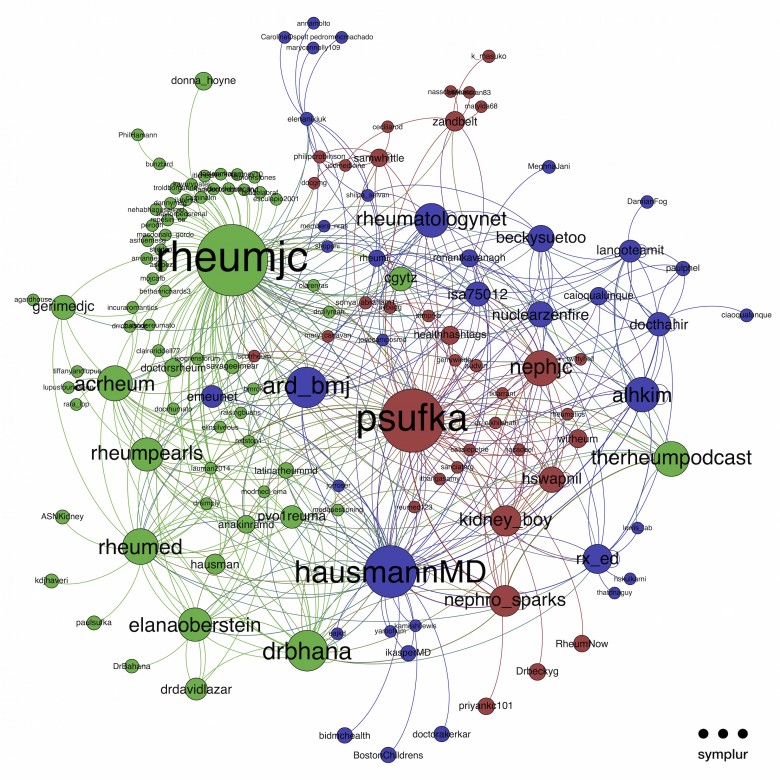“At some point we must go beyond the introduction and into application [of social media].” — Dr. Bryan Vartabedian, 33charts.com
Recently, a number of specialties have started forming journal clubs on Twitter, and during the recent American College of Rheumatology Meeting in Boston, discussions began about rheumatology joining the trend. Within a few weeks, the Rheumatology Journal Club on Twitter was founded, establishing the hashtag #RheumJC.
As defined by Wikipedia, “a journal club is a group of individuals who meet regularly to critically evaluate recent articles in the academic literature.” During medical training, journal club is the prototypical activity for combining social learning with the flipped classroom model.

Among the various social networks, Twitter is unique in that it gives us real-time ability to access information from people all over the world, along with the ability to connect directly with individuals. These unique abilities have led to the use of Twitter being used in innovative ways in medicine never imagined by the original developers.
Applying the power of Twitter to medical journal clubs offers a few important educational advantages:
- Increased number of participants. More minds are almost always better. While this might sound like it would lead to very noisy discussions, the 140 character per tweet limit encourages participants to be concise in their interactions.
- Broader range of knowledge and experiences. Twitter journal clubs are essentially done in a public space, which allows participants to come from all levels of expertise. It is often difficult for experts to look at things with a beginners mind, and the best discussions often start with novices joining and asking the most basic of questions. Additionally, specialists from other fields might joint the discussion (rheumatology was able to join our #NephJC friends for a recent discussion).
- Ability to interact directly with authors. Above all, the opportunity to ask the foremost experts on a specific topic questions is just cool. While this isn’t possible for every session, both #RheumJC (RTX for ANCA vasculitis flares) and #NephJC (multiples times: Nephrocheck, DCT, hyperkalemia, NephJC live) have been fortunate enough to offer this unique opportunity.
More about #RheumJC from our PubMed Commons Journal Club Page:
”#RheumJC is a Twitter-based Rheumatology journal club officially launched in January 2015 for the purpose of bringing together healthcare professionals from all over the world to discuss published scientific literature in rheumatology using Twitter as an interactive platform for engagement. Discussions occur approximately once to twice a month, with two one-hour live chats to allow for international participation. All relevant tweets include the hashtag #RheumJC. Summaries as well as full transcripts of the sessions are posted within a few days on http://www.rheumjc.com. Efforts are made to have every chosen article be open-access so that there are no barriers to participation. Additionally, whenever possible, authors of chosen articles are invited to participate in the live chats.”

5 Responses to “Applying the Power of Twitter to Medical Journal Clubs”
Twitter Journal Clubs | Paul Sufka M.D.
[…] My post on Symplur: Applying the Power of Twitter to Medical Journal Clubs […]
Online Roundup and Upcoming Projects | Paul Sufka M.D.
[…] guest post Applying the Power of Twitter to Medical Journal Clubs on […]
Twitter for Journal Clubs and Medical Education - Hennepin County Medical Center (HCMC) Grand Rounds | Paul Sufka M.D.
[…] Symplur blog: Applying the Power of Twitter to Medical Journal Clubs […]
Expanding the #RheumJC Team - #RheumJC
[…] all, we’re a group that is interested in applying the power of Twitter to rheumatology education through […]
Using Twitter in Medical Education - 2016 ACR Program Directors' Conference - Chicago, IL | Paul Sufka M.D.
[…] Healthcare Hashtags – Symplur: Healthcare Hashtag Project – Symplur blog: Applying the Power of Twitter to Medical Journal Clubs […]